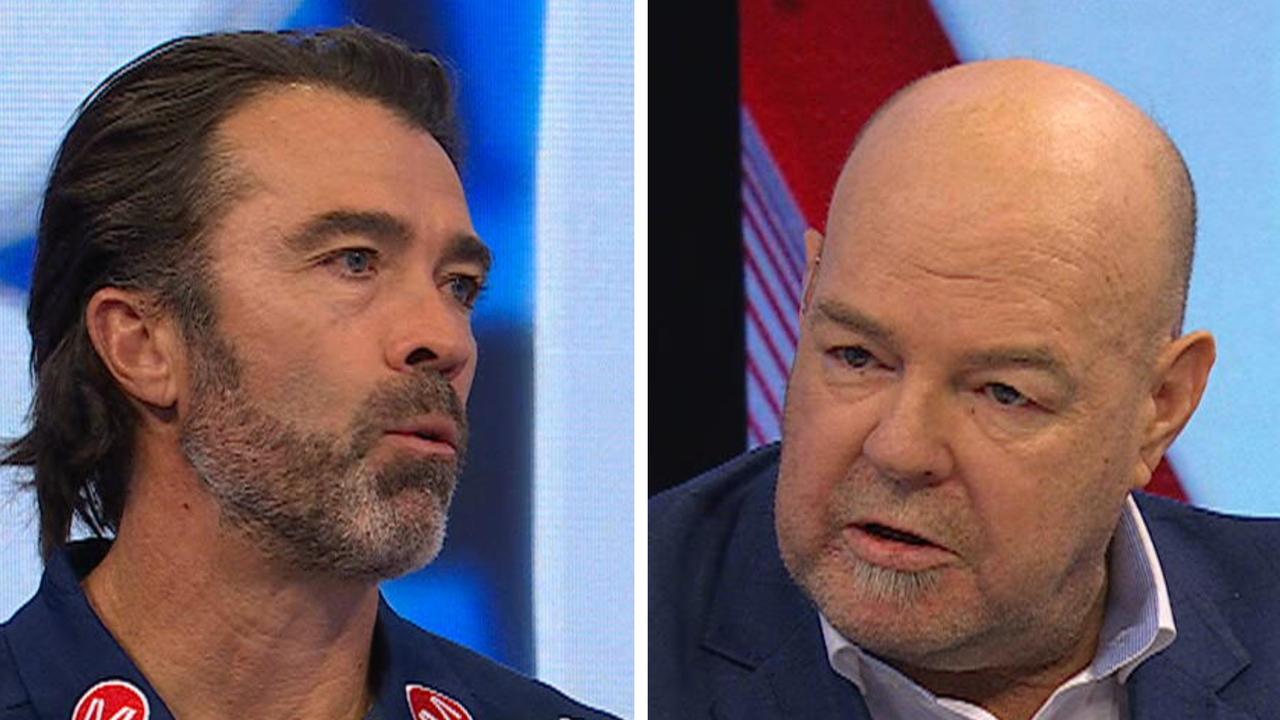Coaches and experts have debated the ineligibility of suspended players for the prestigious Rising Star award after favourites for the award Harley Reid and Sam Darcy were suspended in Round 12.
Reid and Darcy were both banned for two weeks, and in the process removed any chance of winning the award reserved for the best young players in the competition.
Reid’s tackle on Saint Darcy Wilson has been hotly debated by pundits across Australia, while Darcy’s bump from behind on Pie Brayden Maynard was mostly accepted as the right penalty.
Speaking on Fox Footy’s AFL 360, Geelong coach Chris Scott and Hawthorn coach Sam Mitchell joined panellists Gerard Whateley and Mark Robinson, with discussion on the controversial, and widely unknown, rule bringing divide between Scott and Robinson in particular.
Mitchell was the first of the two coaches to be quizzed on their initial thoughts towards the ruling, providing both sides to the argument.
Rising Star no more! Reid cops ban | 01:17
“It’s an interesting question; I like the tradition of the fairest, but what’s fairest back then and what’s fairest now are quite different things,” Mitchell said.
“I think there’s a difference between intention and careless (tribunal gradings), so I think if it’s an intentional act then perhaps it shouldn’t be allowed to be won, but if it’s more careless such as that, I think it might be something the AFL look at.
“I remember it (being the fairest player), because I had an iffy incident in my year that I got off; so I was fortunate that I would’ve been in the same position otherwise.”
The panel then turned their attention towards Cats coach Scott, who ironically won the Rising Star award in 1994 due to counterpart Corey McKernan being suspended.
“I think it’s a relic of the past; doesn’t make any sense to be part of the criteria now – and I think even back in the day… no one’s looking at that incident, or Sam Darcy’s and thinking ‘they shouldn’t be eligible for individual awards because they’re not fair players’ – I mean that’s just nonsense,” Scott explained.
“No, I disagree, I disagree strongly” Robinson replied
“But you’re allowed to be wrong, it’s fine” Scott jokingly rebutted.
The duo then delved in stern, but fair dialogue, as seen in the transcript below:
How did teams prepare for rule change? | 03:52
Mark Robinson: I think what Sam Darcy did was not a really good act whatsoever; he got the two weeks, not just – and with that one, what stood out for me with that tackle, was that it had almost been eliminated from the game somewhat; that really aggressive throw down. With concussion as prevalent as it is – I think we’ve got to be very much aware of the impact of concussion; we’ve got to stamp it out really strongly, and that was going to contribute to that possibly.
Chris Scott: But I don’t think that’s a matter of being unaware – if we take your contention through to its fullest extent, you’re saying if players that have played 300 games and get suspended once, they’re not fair players – that’s nonsense.
MR: Nah, nah, I’m just saying that in this season that we’re playing, if you get suspended for that – I don’t think you should win the Rising Star.
CS: Or the Brownlow?
MR: Yeah nah, nor the Brownlow.
CS: Okay, because I suspect you think that the tradition in the Brownlow is so sacrosanct that if you’ve been suspended, you shouldn’t win the Brownlow. I think coming out of the game is penalty enough; it’s like the best and fairest – most teams, if you miss four or five games from injury you can’t win the best and fairest, and that doesn’t make any sense to me either, but maybe I’m the outlier.
MR: I think I know this, but did you win it (the Rising Star) when Corey McKernan was banned?
CS: I did, yeah. If I was the second-best player that year, I was only the second – he was clearly the best, and I think he might have missed for tripping or something.
Gerard Whateley: He did, which was not a suspension the following year (1995).
CS: I mean, honestly, to be ruled out because of that; that’s just crazy. My point is that – it was poor execution, but no one’s thinking ‘now, all of a sudden he’s labelled as an unfair player, and he should be deprived of winning awards for the rest of the year’. Everyone thinks he should be suspended in the current era, but my point is, when these things were implemented – especially with the Brownlow, say in the (19)20’s – you could punch a player behind the play and not get suspended. Now because the benchmark for being suspended is so much tighter, and the awards kind of haven’t moved with it – and as you say, this award was only instigated in (19)93; it seems a bit antiquated to me.
Hawks coach Mitchell then finished with his own final two cents, stating that regardless of their ineligibility, the eventual winner will still very much cherish the accolade.
“I think it will still have a special moment; I think whoever wins that award, it’s not like you’re going to be read behind (Sam) Darcy and Reid, so you’re still going to get the five votes from each of the contestants, which will be a special moment for whoever does win,” Mitchell enlightened.
Harley Reid is set to face the tribunal on Tuesday night, after opting to challenge his two-week suspension for his sling on Wilson.
Dog Sam Darcy opted not to challenge his appeal, and will return in Round 16.

